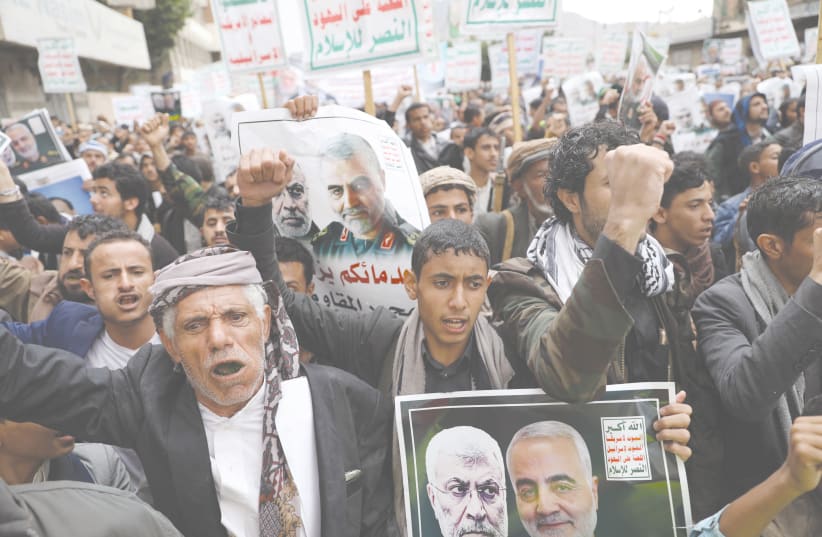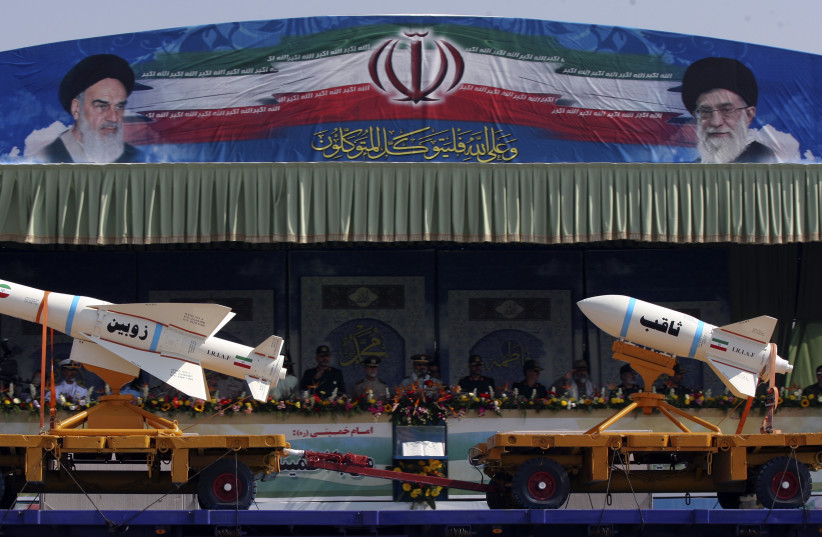The lessons from Russia’s unprovoked incursion into Ukraine will have ripple effects beyond Europe. One example came from the historic Negev Summit that took place on March 29 in Israel that aligned the Foreign Ministers of Israel, Egypt, United Arab Emirates, Morocco, and Bahrain against Iranian pursuit for regional hegemony.
Ukraine learned its lesson that signing the 1994 Budapest Memorandum did not provide sufficient security guarantees in exchange for giving up its nuclear stockpiles. As the US pursues a new nuclear deal with Iran, it now appears that Israel and the United Arab Emirates (UAE) have learned the lesson of the Budapest Memorandum just as Ukraine has, and have reportedly asked the United States for security assurances in connection with the Iran nuclear deal.
Iran learned that seeking a nuclear weapon will fill its coffers by easing sanctions. A new agreement will give Iran – the world’s largest state sponsor of terrorism – access to billions of dollars to increase its support for terrorism, remove its proxies from terrorism lists, and enhance its ballistic missile program.
The P5+1 countries of the United States, United Kingdom, Germany, Russia, France, and China came back to the negotiating table with a much stronger hand due to years of the maximum pressure campaign. However, failing to act against Iranian aggression during these negotiations has demonstrated weakness.
During negotiations in Vienna, Iran has continued its terrorist activities through the Islamic Revolutionary Guard Corps (IRGC) and its proxy – the Houthis. Congress has tried to hold the Saudi-led coalition accountable for actions in Yemen by attempting to end U.S. assistance and block arms sales. Yet, it has failed to hold the Houthis equally responsible for their indiscriminate missile barrages against civilian populations.
Rewarding the Houthis by removing it from the Foreign Terrorist Organization (FTO) list was a critical mistake. The justification for their removal was based on humanitarian grounds. Yet, the US Department of Treasury already offers exemptions and licenses “to help facilitate the uninterrupted flow of humanitarian assistance” in Yemen that may otherwise be considered prohibited under U.S. sanctions.
The Houthis have proven they cannot be trusted with humanitarian matters as it has diverted food and failed to live up to its agreements which led to aid being partially suspended. In 2019, the World Food Program (WFP) stated “WFP has been seeking the support of the Sanaa-based authorities to introduce a biometric registration system that would prevent diversion and protect the Yemeni families we serve, ensuring food reaches those who need it most.”
Let’s be clear: the Houthis are supported, financed and armed by Iran just like other designated FTO proxies like Hezbollah, Hamas and the Palestinian Islamic Jihad, so why are the Houthis any different? When the Houthis were designated an FTO, the Trump administration stated that the IRGC has supplied the Houthis with missiles, drones, and training, allowing the group to target airports and other critical infrastructure and these nefarious activities threaten regional security today.
Since the FTO designation was lifted, the Houthis have conducted several attacks including firing ballistic missiles and drones aimed at Al-Dhafra Air base in the UAE where thousands of US troops are present and also during the visit of Israeli President Herzog.
The Houthis have also regularly launched missiles and drones in Saudi Arabia targeting oil refineries, King Abdullah Airport in Jizan, a commercial airport in Abha and other facilities run by the oil company Aramco, including attacking a fuel depot in Jeddah just recently.
Iran took advantage of the Houthi delisting and unleashed its other proxies to continue undermining US national security interests in Iraq and Syria. Iran demanded that the IRGC also be delisted, which is dangerous. The Iranian Revolutionary Guard Corps and its Quds Force have a long rap sheet of terrorist activists against the US and is responsible for killing US citizens.
The fact that the Biden administration finally sanctioned Iran’s development and use of ballistic missiles is a positive step forward. Ballistic missiles is Iran’s latest preferred weapon of choice, which is significant since the original Joint Comprehensive Plan of Action (Iran nuclear deal) did not restrict ballistic missiles – yet another miscalculation of that flawed agreement. Former Commander of US Central Command General Kenneth McKenzie recently testified before Congress that Iran has invested heavily in their ballistic missile program, amassed over 3,000 ballistic missiles, and some can reach Israel. Iran has not hesitated to use these missiles against the US, striking US facilities in Iraq, including targeting the US Consulate in Erbil last month.
There may be a nuclear arms race in the Middle East around the corner, but in addition to it there will be a conventional arms race. More countries will build up the military arsenal, including air defense systems, to protect themselves from Iranian threats.
Iran has an abysmal human rights record, is holding US citizens unjustly as hostages, and cannot be trusted to uphold any agreement. Iran has stonewalled the International Atomic Energy Agency, blocked access including to military sites and not answered outstanding inquiries on the possible military dimensions of its nuclear ambitions. Also, Iran has installed advanced centrifuges and enriched uranium to 60% - close to weapons-grade. These developments amount to knowledge and experience gained, which cannot be unlearned.
The best way to guarantee that Iran never obtains a nuclear weapon is to dismantle its nuclear infrastructure. Delaying their nuclear ambitions, even for just a few years, does not decrease the threat to our allies, especially the existential threat it poses to our ally Israel.
Any new security agreement in the Middle East must include combating Iran’s proxies, its support for terrorism and its use of ballistic missiles. Nations have been reluctant to directly confront a nuclear power like Russia in Ukraine. If Iran becomes a nuclear state someday, will the international community confront Tehran to secure peace, security and stability in the Middle East?
The writer is chief of staff and senior adviser to Ambassador Mark Green, president and CEO of the Woodrow Wilson International Center for Scholars. He formerly was national security adviser at the US Agency for International Development and staff director for the Subcommittee on the Middle East and North Africa for former Rep. Ileana Ros-Lehtinen (R-Fla.). This opinion is solely that of the author and does not represent the views of the Wilson Center.

